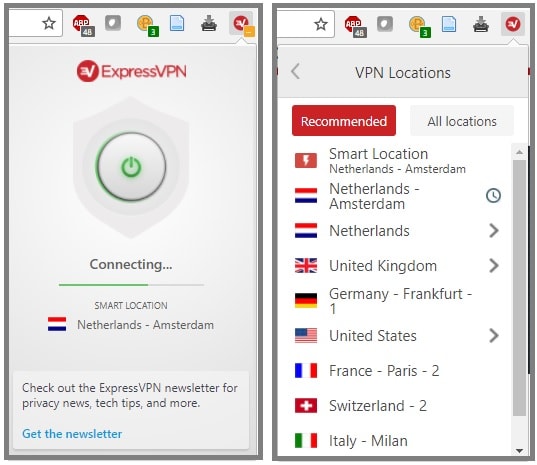If you want to browse the web securely and anonymously, it’s important to install the right browser extensions in addition to the right browser.
Browser extensions will protect you from advertisements, keep your passwords safe, and your internet behavior anonymous.
You can easily improve your internet experience by actively using:
- The right internet browser
- A good VPN service
- The browser extension of your VPN services
- An adblocker to filter annoying ads
- A password manager to generate strong passwords and keep them safe
Do you value your online privacy and security and would you like to know which are the best browser extensions to use? Read our full article below to find out!
At this moment, you might be the only person physically using your computer. You might even be the only person in the room. However, if you aren’t taking steps to remain anonymous on the internet, then you aren’t browsing alone. Every time you go online, you leave a trail of information that’s visible to more third parties than you might think – and clearing your browser’s history won’t change anything about that.
These days we can’t go a week without news of overreaching governments trying to monitor and control their citizens on the internet. But governments aren’t the only ones trying to get a look at your online traffic. There are several other lower-profile entities that could be collecting your identifying information without your knowing. These include your ISP, search engines, individual websites, social networks, local network administrators, apps, your operating system, and everyone’s favorite internet villain: hackers.
In this article, you’ll find a number of browser extensions that can help you keep an eye on your privacy. VPN extensions will help you surf anonymously and prevent unwanted access to your data, while adblockers can block annoying ads and password managers keep your passwords secure without you having to remember them.
What is a browser extension?
Before introducing the extensions themselves, it’s important to understand what a browser extension is exactly. A browser extension is an application that attaches itself to your browser, for example to Firefox, Chrome, Edge or Safari, to augment its operation. Each extension has its own specific function and is supposed to take on a task that the browser can’t perform by itself. Most browsers only have the bare necessities when it comes to functionality. Your online privacy and protection can be increased a lot by choosing the right third-party add-ons. While browsers continue to advance in their options, they can’t match the features of dedicated apps. These apps include virtual private networks (VPNs), ad blockers, and password managers.
VPN extensions for secure and private browsing
 Virtual private networks have been around for a long time, but until relatively recently they were the realm of IT professionals. Governments and businesses used them to provide employees with secure access from remote locations. Now, however, almost anyone can use one. A VPN redirects your traffic through a separate private network on the way to its final destination. The VPN replaces the user’s information with its own, so even the final website doesn’t know where the original traffic came from. There are three principal benefits to VPNs:
Virtual private networks have been around for a long time, but until relatively recently they were the realm of IT professionals. Governments and businesses used them to provide employees with secure access from remote locations. Now, however, almost anyone can use one. A VPN redirects your traffic through a separate private network on the way to its final destination. The VPN replaces the user’s information with its own, so even the final website doesn’t know where the original traffic came from. There are three principal benefits to VPNs:
- Anonymity: Every website reads and often stores the IP data of its users. This data contains information about your computer and network connection, and could be used to identify you personally. As mentioned above, a VPN adds an intermediate step to your data’s journey. Therefore, the target website can only see the IP information of the remote network, not yours.
- Secure Navigation: In addition to anonymizing your data, VPN networks are well encrypted. This makes the data itself extremely hard, sometimes impossible to read by unauthorized third parties. This is especially useful when connecting to unsecured public Wi-Fi networks such as those in cafes, libraries, etc.
- Unblocked Content: The internet is the greatest advancement in making the world a smaller and better connected place for humanity. It’s full of rich, diverse content from all over the globe. Unfortunately, certain content still isn’t accessible outside a certain geographical area. Or worse: some content is even blocked in specific countries. It’s quite common for YouTube and Netflix users to find themselves faced with a message stating that a popular video is not available in their country. VPNs allow you to circumvent such geoblocks by directing your traffic through a server in the video’s host country.
VPNs are most often available as stand-alone applications, but two of our favorites include intuitive browser extensions for easy access to their features. Here they are:
ExpressVPN browser extension for Firefox, Chrome, and Safari
ExpressVPN is a popular VPN service that constantly earns top marks in our in-house reviews. Like all premium VPNs, ExpressVPN requires a subscription, although you certainly get what you pay for. After installing the application on your computer, the extension gives you direct access to settings and features directly from within your browser of choice. This allows you to change VPN servers to match your target web page without having to leave the browser. ExpressVPN boasts a network of more than 3000 servers in 94 countries, so you won’t have any problems finding one that suits your needs. Like the app itself, the extension is very easy to use and pleasant to work with.
ExpressVPN has occupied the number one position in our top 5 best VPNs for a long time. Their VPN browser extension, too, works equally well. The ExpressVPN browser extension secures and anonymizes your internet traffic. In addition, the extension offers functionalities that help to encrypt communication with many websites. This allows you to surf the internet more securely. To use this extension, you’ll have to first get an ExpressVPN subscription by clicking the button in the box below. After downloading the app and the browser extension on the ExpressVPN website, you’ll be able to surf and download safely with just a few clicks.
- Very easy to use VPN
- Perfect for anonymous browsing, downloading, and streaming (i.e. Netflix)
- 3000+ servers in 94 countries
The browser extension that ExpressVPN offers, will appear in the top right corner of your browser after you’ve installed it. Within the screen that pops up, you can easily choose a location and activate the VPN. The screenshots below can give you an idea of the look of this extension.

NordVPN browser extension for Chrome and Firefox
NordVPN is another VPN service with a well-designed browser extension option. Though it’s a less expensive alternative for ExpressVPN, it’s still very much a premium service. It has a network of almost 5,500 servers, spread out over 59 countries. If security is a top priority, NordVPN’s 256-bit AES data encryption and support for all major VPN protocols make it a confident choice. It might not be as fast or reach as many countries as ExpressVPN, but you would be hard-pressed to find anything better at this price point.
The NordVPN browser extension is available for Chrome, Brave and Firefox and encrypts your browsing traffic. It also hides your IP address so that your online activities remain anonymous. The CyberSec feature protects your device against malware and other cyberattacks. Downloading it is very easy, although you do need a subscription for it to work. Click on the button below to go to the NordVPN website. Follow the instructions, download the extension, and you’ll be good to go in but a few minutes.
- Excellent protection and a large network of servers
- Nice and pleasing application
- No logs
VPN extensions for Opera
The Opera browser isn’t used as much as other browsers, such as Chrome, Edge and Firefox. Hence, most big VPN services, such as ExpressVPN and NordVPN, don’t offer any browser extensions for Opera. This doesn’t mean Opera users don’t have any options, however. A lot of VPNs offer VPN extensions that are also supported by the Opera browser. Options include Zenmate VPN, PIA, and Tunnelbear. By looking at the Opera extension page, you’ll be able to find all other browser extensions available for Opera, as well.
Some of the extensions mentioned, such as Tunnelbear, can be used completely free of charge. However, it’s important to note that free VPNs are generally a bad idea. Many VPN apps that are offered online won’t actually keep you and your data traffic safe. They could be collecting your personal information to sell it to other parties, implant all sorts of malware on your device, or earn money by showing you an excessive amount of ads. If you really want to use a free VPN service, make sure to get one of good quality, for example by checking out our list with decent free VPN services first.
Warning: don’t use Hola VPN
Hola is a very popular VPN extension that can be used in several browsers. It’s easy, fast, and can be used for free! Sounds perfect, right? Well, not really. In fact, Hola can’t even really be called a VPN at all. Unlike premium VPN options, Hola is unencrypted, has no customer service, and does not readily support Netflix or torrents. Additionally, while services such as NordVPN and ExpressVPN keep no traffic logs, Hola does. This means that all of your online data is stored and your traffic can easily be traced back to you.
Even worse, Hola is a peer-to-peer network. The people behind Hola don’t maintain their own network of servers. Instead, they piggy-back on the bandwidth of their users. This means that paid users connect through the IP addresses of non-paid users. Hola claims that this method is secure, but it’s really not. Without any encryption, a no-log policy, and any other sort of reassurance, anything could go wrong while you use Hola. In short: stay far away from this fake VPN.
Ad Blockers for eliminating unwanted ads and scripts
An ad blocking extension is one of the best and easiest ways to enhance your online experience. Like the name implies, these extensions block ads and other unwanted scripts from running on the pages you visit. Ads can be annoying, especially the pop-up kind, but are usually harmless to the end-user. That doesn’t go for all ads, however: some contain malware or redirect to pages that do, others contain offensive content and NSFW imagery that, even when unrelated to the actual content of the page you were visiting, could make for an awkward situation if you’re in public. Ad blockers give you better control over your online experience, which is why we highly recommend using them – as long as you use the right one.
uBlock Origin
 uBlock Origin works with all major browsers and uses few system resources. Like most adblockers, you can download it for free (for Firefox, Chrome, Opera). Once you’ve successfully installed uBlock Origin in your browser, this extension effectively filters out any ads and unwanted scripts. Because it’s been around for a long time and constantly sends out new updates, almost all ads you could encounter will be blocked.
uBlock Origin works with all major browsers and uses few system resources. Like most adblockers, you can download it for free (for Firefox, Chrome, Opera). Once you’ve successfully installed uBlock Origin in your browser, this extension effectively filters out any ads and unwanted scripts. Because it’s been around for a long time and constantly sends out new updates, almost all ads you could encounter will be blocked.
This extension comes with a comprehensive default blocking list and a tool for blocking page elements on the fly. All you have to do is right-click on an image or field and choose “Block Element”. This brings up a text box filled with the URL of the element. Click “Create” to add the element to the blocking list and it will immediately disappear. uBlock Origin is customizable as well, allowing you to whitelist trusted pages.
While some other adblockers might be slightly easier to use, uBlock Origin is an extremely good adblocker. It works excellently, is completely free, and doesn’t let any ads through just to make money off of them.
AdBlock Plus
 The most popular ad blocker on the market is AdBlock Plus. It’s a free extension available for every major browser (namely Firefox, Chrome, Edge, Safari, and Opera) and a few minor ones as well (such as Yandex, Maxthon, and Chromium). A freshly installed extension will block most ads with its default list. It allows you to import other lists or to create your own. You also have the option to enable or disable blocking on a specific page. This is very important for the continued existence of many websites. Sadly, AdBlock Plus also has a negative side.
The most popular ad blocker on the market is AdBlock Plus. It’s a free extension available for every major browser (namely Firefox, Chrome, Edge, Safari, and Opera) and a few minor ones as well (such as Yandex, Maxthon, and Chromium). A freshly installed extension will block most ads with its default list. It allows you to import other lists or to create your own. You also have the option to enable or disable blocking on a specific page. This is very important for the continued existence of many websites. Sadly, AdBlock Plus also has a negative side.
One major drawback of AdBlock Plus is their “Acceptable Ads” initiative. One of the primary ways AdBlock Plus makes money is by allowing companies to pay to let their ads through. Therefore, even though you are using an “AdBlocker” you can still be served ads if a company pays enough. For us, this completely defeats the purpose, and we recommend seeking an alternative like uBlock Origin.
Support your favorite websites by whitelisting them
It’s important to recognize that blocking ads directly affects the revenue of the sites you visit. Browser extensions such as uBlock Origin and AdBlock Plus are a breath of fresh air for our personal online privacy and our online experience, but they negatively affect the websites you visit. This can, in turn, turn out badly for you as a visitor.
Most websites are free to use because the creators can sell ad space. If everyone blocked these ads, a lot of websites would completely miss out on their income. In order to keep on existing, websites could then require a paid membership. In this case, you’ll have to pay in order to get access to the website’s content. If a website doesn’t do this or is unable to, it might disappear entirely.
Making and maintaining a website costs time, effort and, in most cases, money. Is there a certain website that you believe deserves any revenue they can catch from showing you ads? Then you can opt to whitelist that website in both AdBlock Plus and uBlock Origin. This way, you’ll get to see the ads on those pages anyway, and you’ll be helping them sustain their website. Therefore, if you trust a website, and their ads aren’t too intrusive, consider supporting them by adding the URL to your whitelist.
Some websites even completely deny users access to their content when they’re using an adblocker. If you surf to such a site, you’ll see a message, telling you you’ll only get access if you whitelist the website. This way, websites can ‘force’ internet users to (partly) turn off their adblockers.
Extensions to help you surf safely and anonymously
It’s almost impossible to surf the web without leaving behind traces of information about yourself. You’ll undoubtedly encounter cookies and other trackers that try to trace your internet behavior. Fortunately, quite a few browser extensions have been developed that can help you make your internet sessions much safer and more anonymous. We’ll discuss a couple of good options here.
Privacy Badger
 Privacy Badger is a smart, free extension developed by the Electronic Frontier Foundation that gradually learns to block invisible trackers. Once it has been installed, the extension will start keeping an eye on all possible trackers on every website you visit. The extension won’t block any cookies to begin with. Instead, Privacy Badger will use the information it collects to learn. As time goes on, Privacy Badger will realize which third party cookies are following you on the web constantly and block those. As a result, you won’t continuously run into the same handbag in your ads, while the useful and less intrusive cookies remain intact.
Privacy Badger is a smart, free extension developed by the Electronic Frontier Foundation that gradually learns to block invisible trackers. Once it has been installed, the extension will start keeping an eye on all possible trackers on every website you visit. The extension won’t block any cookies to begin with. Instead, Privacy Badger will use the information it collects to learn. As time goes on, Privacy Badger will realize which third party cookies are following you on the web constantly and block those. As a result, you won’t continuously run into the same handbag in your ads, while the useful and less intrusive cookies remain intact.
The Privacy Badger extension works with a unique learning system. Because of this, the extension will work better and more effectively the longer you use it. Privacy Badger currently works for Opera, Chrome, Firefox, and Firefox on Android.
Ghostery
 Ghostery is another extension that aims to control website trackers. It reveals any tracking cookies active on the website you’re visiting and gives you the opportunity to block them. If you block cookies, websites will be able to collect less information about you. Therefore, Ghostery increases your online privacy and safety. Your ads won’t be adjusted to your online behavior any longer. For example, you won’t constantly find all those ads about discount wedding dresses everywhere, just because you told Facebook you were at your cousin’s wedding last week.
Ghostery is another extension that aims to control website trackers. It reveals any tracking cookies active on the website you’re visiting and gives you the opportunity to block them. If you block cookies, websites will be able to collect less information about you. Therefore, Ghostery increases your online privacy and safety. Your ads won’t be adjusted to your online behavior any longer. For example, you won’t constantly find all those ads about discount wedding dresses everywhere, just because you told Facebook you were at your cousin’s wedding last week.
As many of the browser extensions discussed in this article, Ghostery is free and available for most browsers, including Firefox, Chrome, Opera, Safari, Edge, Brave and Cliqz. They offer a mobile version for both Android and iOS as well.
Tip: Some users have expressed concern about Ghostery’s own privacy policy. It is possible to opt-in to Ghostery’s program called GhostRank data collection. This is information is gathered to help improve the quality of the service. However, if you choose not to opt-in to GhostRank, you won’t have to worry about any data being collected as you use Ghostery.
Cookie AutoDelete
 The name of this extension pretty much speaks for itself. Cookie AutoDelete ensures that any cookies in your browser are automatically deleted after you close a tab. Some cookies might find their way past Ghostery or Privacy Badger, which is where Cookie AutoDelete steps in. It’s important to regularly delete your cookies. Without doing so, websites will be able to follow you online for an extended amount of time. When using this extension, you won’t have to remember to clear out your cache: the program does it for you.
The name of this extension pretty much speaks for itself. Cookie AutoDelete ensures that any cookies in your browser are automatically deleted after you close a tab. Some cookies might find their way past Ghostery or Privacy Badger, which is where Cookie AutoDelete steps in. It’s important to regularly delete your cookies. Without doing so, websites will be able to follow you online for an extended amount of time. When using this extension, you won’t have to remember to clear out your cache: the program does it for you.
If you want to, you can add cookies to a Cookie AutoDelete whitelist. This means you trust those cookies and don’t want them deleted. Using a cookie whitelist can be quite useful. For example, if you add your Netflix cookies to this list, you won’t have to log in every time you surf to Netflix’s homepage in a new tab. Cookie AutoDelete is available for Firefox and Chrome.
HTTPS Everywhere
 Websites can work with the HTTP or the HTTPS protocol. You can clearly see this in the URL of the site, which will start with either http:// or https://. The extra ‘s’ in the latter means your communication with websites using that protocol will be encrypted. This ensures your online safety and privacy: your online activities on that website won’t be visible to others. Moreover, the information exchange between you and the website can’t be altered by outside forces. This way, the chance you’ll accidentally end up on a fake website pretending to be your online bank environment shrinks significantly.
Websites can work with the HTTP or the HTTPS protocol. You can clearly see this in the URL of the site, which will start with either http:// or https://. The extra ‘s’ in the latter means your communication with websites using that protocol will be encrypted. This ensures your online safety and privacy: your online activities on that website won’t be visible to others. Moreover, the information exchange between you and the website can’t be altered by outside forces. This way, the chance you’ll accidentally end up on a fake website pretending to be your online bank environment shrinks significantly.
On to the actual extension: HTTPS Everywhere ensures that any websites that can work with HTTPS, will do so. This increases your online security. The HTTPS Everywhere extension was produced as a collaboration between the Electronic Frontier Foundation, which also developed Privacy Badger, and The Tor Project. HTTPS Everywhere is available for Firefox, Chrome, Opera, Android and Brave.
DuckDuckGo Privacy Essentials

DuckDuckGo is a privacy-concerned company that has devoted itself to spreading privacy on the web by offering alternative services for less privacy-concerned companies. Most notably, DuckDuckGo created an alternative search engine to Google that actually respects your privacy. You can visit it at https://duckduckgo.com
Privacy Essentials is the latest iteration of their portfolio. This extension helps protect your privacy through three mechanisms:
- Automatically block any unwanted trackers
- Automatically make sites use their better secured HTTPS version of the website. (installing this extension means you no longer need HTTPS Everywhere.
- Provide an overview of any website you visit where you can quickly gauge the reliability and trustworthiness of a website in a single window.
DuckDuckGo Privacy Essentials is free and is available for Firefox, Chrome, Brave, Opera, Android, and iPhone.
Password manager browser extensions
Many of us have several online accounts for things like banking, social networks, message boards, email, and so on. Ideally, you should have a different username and a unique strong password for each account. Remembering all those different passwords is hard, and you don’t want to write them all down on a piece of paper that could be lost or stolen. Instead, you can use a password manager. A password manager encrypts and stores your passwords in one central location, so instead of remembering dozens, you only have to remember one. Most of the time, a password manager is a simple browser extension. We’ll discuss a couple of good password managers right here to help you get started.
LastPass
 Update March 2021: research revealed that LastPass’s Android app works with data trackers, making this password manager not ideal in terms of privacy.
Update March 2021: research revealed that LastPass’s Android app works with data trackers, making this password manager not ideal in terms of privacy.
LastPass is a popular password manager that secures all your passwords under one master passphrase. It allows you to maintain a vault of long and complex passwords for all your accounts so you no longer have to rely on your memory. LastPass boasts robust AES-256 bit local-only encryption that keeps your data hidden from everyone but you. Your master password and encryption keys are kept on your device and never sent to LastPass’ servers.
Lastpass offers plugins and extensions for almost all big browsers and works on desktop, laptop, tablet and smartphone. Any changes you make to your account, for example when you add a new login, are synchronized across your devices.
The basic functions of LastPass are available for free. Aside from those, the company offers a variety of premium tiers that deliver features like multi-factor authentication, priority tech support, encrypted file storage, multiple licenses, shared folders, and a host of business-specific functions. To get access all of these extra functions, you’ll have to pay. Regardless, LastPass is a very decent password manager with a free version that works more than adequately. Want to know more about it? You can visit the LastPass website here.
Dashlane
 Dashlane is another good option for anyone who’s looking for a simple password manager. Extensions work on all popular browsers, including Chrome, Firefox, Internet Explorer, Safari, Edge, Opera, and Brave. Like LastPass, it uses high levels of encryption and has a freemium-model, meaning that there’s a free version available, but you’ll have to pay to be able to work with certain functions. The Dashlane software maintains your encryption keys and master password locally on your device, so the company itself doesn’t have access to them.
Dashlane is another good option for anyone who’s looking for a simple password manager. Extensions work on all popular browsers, including Chrome, Firefox, Internet Explorer, Safari, Edge, Opera, and Brave. Like LastPass, it uses high levels of encryption and has a freemium-model, meaning that there’s a free version available, but you’ll have to pay to be able to work with certain functions. The Dashlane software maintains your encryption keys and master password locally on your device, so the company itself doesn’t have access to them.
With its free version, Dashlane allows you to manage up to 50 passwords on one device. With a premium plan, you’re allowed unlimited devices, secure file storage, remote account access, stronger two-factor authentication, and more. Dashlane also monitors the dark web for lists of leaked and stolen account info and sends you an alert if your info comes up. If you’re interested in using Dashlane, you can visit their official website here.
RememBear
 A third possible option is RememBear. This password manager was developed by TunnelBear. TunnelBear also has its own VPN service, which we’ve tested extensively on our platform. RememBear and TunnelBear are known for their user-friendly and even funny interfaces. Everything is thematized: when you use RememBear, you’ll be assigned your own ‘bear’ who keeps your passwords safe. Besides that, the interface is filled with bear-puns, as the name of the service might already suggest.
A third possible option is RememBear. This password manager was developed by TunnelBear. TunnelBear also has its own VPN service, which we’ve tested extensively on our platform. RememBear and TunnelBear are known for their user-friendly and even funny interfaces. Everything is thematized: when you use RememBear, you’ll be assigned your own ‘bear’ who keeps your passwords safe. Besides that, the interface is filled with bear-puns, as the name of the service might already suggest.
This entertaining appearance doesn’t mean, however, that RememBear lacks in terms of security. The extension uses strong end-to-end AES256 encryption and successfully made it through an independent audit. RememBear works on multiple devices at the same time and automatically synchronizes any information across those devices. Aside from just your passwords and logins, you can use the program to save sensitive notes as well. RememBear has a browser extension for Chrome, Firefox, and Safari. Moreover, apps are available for iOS, Android, Windows, and macOS. For more info and to download your own bear, we’d like to refer you to the RememBear website.
Final thoughts
Using the right browser extensions can make your online life easier and safer. Do you want to get the most out of your internet experience? You can do this by actively using the following programs and extensions:
- The right internet browser
- A VPN service
- A browser extension for your VPN service
- An adblocker to filter annoying and pushy ads off your screen
- A password manager to generate and keep safe any (strong) passwords you use
These are our recommended extensions for staying secure online. Of course, there are many other ways to increase your online anonymity and safety. Want to read more? Make sure to check out our ‘anonymous browsing’ section.
Are you looking for an answer to a question about browser extensions? Have a look at our frequently asked questions below. Check whether your question is listed and simply click on it to read the answer.
A browser extension is a program you can download and add to your browser. Each extension has a specific function and is meant to perform a specific task that the browser can’t do on its own. For example, some extensions block certain advertisements.
A VPN browser extension can be used to protect your IP address when using a browser such as Chrome or Firefox. Some VPN providers, such as ExpressVPN and NordVPN, offer their own browser extensions.
NordVPN and ExpressVPN offer the best browser extensions. They are easy to install and offer freedom and security for the browser you’re using.
We recommend the following browser extensions for more online privacy:
- Password managers with browser extensions: for remembering and keeping passwords secure.
- Adblocker extensions: for blocking pop-ups and annoying advertisements.


